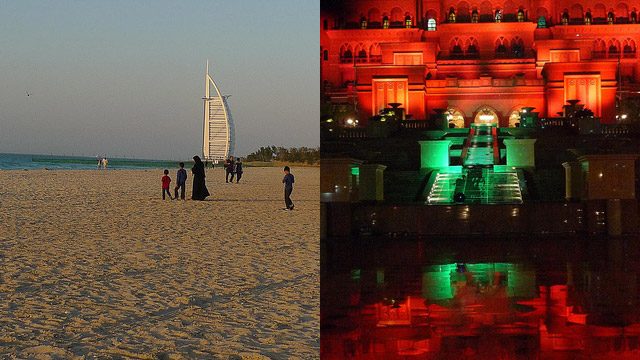SUMMARY
This is AI generated summarization, which may have errors. For context, always refer to the full article.

I’ve always thought that grass is always greener when you are a Filipino working abroad. Hours upon hours of my days were spent on the Internet then, waiting for my long distance lover to log onto Instant Messenger to chat with me and tell me about his days in Dubai. Oh, how I longed to be by his side.
Often I found myself green with envy whenever he shared photos on the social network, grinning from ear to ear, monkeying around with his new-found friends, exploring the country where everything was new.
He was there and here I was, stuck in the humdrum Metro Manila routine: getting up before the sun rises, commuting and being stuck in traffic for a good two hours, slaving away for more than 10 hours a day in the concrete towers of Makati and getting home when everyone was asleep.
Seeing those photos, reading and hearing his stories and being at the receiving end of the fruits of his labor – a new digital camera, a new laptop, vacations in Tagaytay, Baguio and Pagudpud – I just knew that life outside the country was so much better.
No wonder millions of Filipinos leave the country for those greener pastures. It was one great adventure, an opportunity for better finances for a more comfortable life and then some.
But when I found myself in his shoes, joining him in Dubai, I realized that being an OFW isn’t necessarily always greener and it simply isn’t for everyone. Feeding on those greener pastures came at a hefty price; it was no free lunch or a walk in Luneta Park.
I wasn’t one of those luckier expats who had a relocation allowance and an entire cargo van, which I could stuff with whatever I could not part with. I only had 30 kilograms worth of personal belongings to my name such that much that I could stuff into a suitcase and a duffel bag – 20 outfits, 10 books, 5 pairs of shoes, two wedding photos and my favorite stinky pillow – and everything else was left behind.
As a new bride then, I even parted with my wedding gown, which I would have wanted to keep and wear to relive that special day 10 or 20 or 50 years down the line. The rest of what I own – photographs of my childhood, hand-written letters, trophies and medals, more books and clothes – were left in the bodega, fading away under layers of dust and gathering mold.
As with my possessions, I said good-bye to my family and friends, who are my source of solace, sanity and security. I bid adieu to the continuity of my career, which I had worked fingers to the bone for 7 years.
I said adios to the overlooked developing country luxury having househelp to do seemingly mundane house chores like washing, drying and ironing clothes. I gave a last snuggle and pat to our family pets – Kimmy, the farting mini pinscher; Barney, the hotdog; Mandu, the dashing Shetland Sheepdog; Snowball, the ancient 14-year-old cat, and her kitten brigade.
I blew a kiss farewell to my favorite food haunts like Mien San along Gilmore Avenue, which was a family favorite and my late Friday night stress buster with my foodie trio.
Saying good-bye to the way of life I was used to was not as easy. I learned and unlearned things as if I was a baby reborn into another world and another place in time. I had no sense of direction with zero familiarity of the highways, neighborhoods and alleys.
Every turn into a corner I did with caution, not knowing what or whom I could bump into. I was unfamiliar dealing with people of other nationalities, other than that of my own and the occasional tourist.
And in Dubai, where 80% of the population are expats too, this meant dealing with, struggling to understand, and making sense different cultures, behaviors and points of view of people from all over – Lebanon, the UK, India, Uzbekistan, Somalia, Iraq, Australia, and hundreds more.
On top of that, I was groping in the dark, uneasy with the new and ever changing laws of Dubai. Sure, it was one of the most open cities in the Middle East, but one can never be too sure because, despite all its modernity, it was and still is a city governed by Islamic laws, even if you are not Muslim. You live in their country, you follow their rules.
Then there was the job situation. I wasn’t as lucky as others who nabbed their overseas jobs from the Philippines. I had to find a job and it was 8 long months of cold calls, walk-in resumé submissions, online submissions, and desperate pulling of the very few strings I got in that foreign land.
I searched high, trying to continue on the career path I started with a mid-management position; yet I stumbled low, when I learned in one job interview that in Dubai, salaries are tiered according to nationality, an unspoken rule in the glitzy desert city.
And after 8 months of searching, I eventually found a job. “You are over-qualified. This is an entry-level position. Are you fine with that?” the interviewer asked. I quickly computed the monthly salary they offered and it was just shy of what I was earning back home, and to think that the cost of living in Dubai was 3 times more than the Philippines.
In my mind and in my heart, I should’ve been paid 3 times more, but I wouldn’t be and I still accepted it because it was so much better than having no job and earning none.
I shared these challenges of living abroad with family and friends, but I eventually learned how it would not help the way I wanted it to. They were never and could not be physically there.
Yes, there was the Internet, but it is not the same to have them there to catch you, be a shoulder to cry on and comfort you when you fall down hard. And they simply could never fully understand what I was going through, unless they, too, packed their bags and went.
So I turned callous to their advise: “Umuwi ka na lang kasi (Just come home).” I knew I complained to the high heavens and, at times, wallowed in misery, but I refused to be a copout and come home because I had invested too much and actually learned so much about myself, beyond what I could learn if I had chosen to stay put.
I wiped my tears away, realized I just needed to tone down the drama, permanently put on my brave undies, find pockets of happiness, and focus on the very reason why I left the Philippines: for love and for family.
Being an OFW was definitely not greener pastures for me in the financial sense. I’ve not acquired new gadgets or designer digs; nor have I been able to send significant amounts of money to my family back home to afford a kabuhayan showcase or been able to fill up balikbayan boxes filled with pasalubong for friends and other relatives.
I’ve never even gotten the chance to have a grand vacation, travelling around the Philippines. But if greener pastures means growing as a person, then I’ve grazed on them for sure.
It was a great adventure indeed, one that never in my wildest dreams I imagined I’d go through. In fact, it was so amazing that I did it again – let go of the unnecessary, packed my two suitcases with the essentials and left tax-free living in Dubai a year ago to jumpstart another chapter in my OFW life together with my ex-long distance lover and now husband in the United States.
 Didi Paterno-Magpali is an OFW: Overseas Filipino’s Wife, writer and blogger. In 2011, She left the Philippines, her family, her friends, and her advertising career for Dubai, United Arab Emirates in the name of love. She currently resides in the US with her husband, taking care of domestic matters, loving her time in the kitchen and writing about her bite-sized expat stories and food adventures on D for Delicious.
Didi Paterno-Magpali is an OFW: Overseas Filipino’s Wife, writer and blogger. In 2011, She left the Philippines, her family, her friends, and her advertising career for Dubai, United Arab Emirates in the name of love. She currently resides in the US with her husband, taking care of domestic matters, loving her time in the kitchen and writing about her bite-sized expat stories and food adventures on D for Delicious.
Add a comment
How does this make you feel?
There are no comments yet. Add your comment to start the conversation.